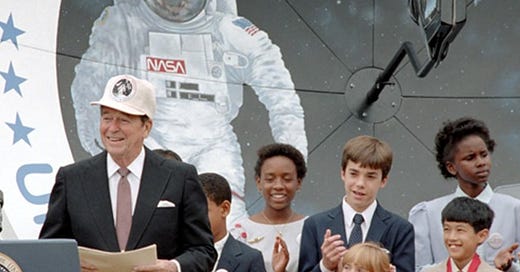🚀 Was Ronald Reagan anti-progress? (Spoiler: He was not.)
Also: 5 Quick Questions for … health economist Ben Ippolito on drug prices and innovation
In This Issue
The Essay: Was Ronald Reagan anti-progress? (Spoiler: He was not.)
5QQ: 5 Quick Questions for … health economist Ben Ippolito on drug prices and innovation
Micro Reads
Quote of the Issue
“For if enough people were really convinced that growth should be halted, and if they acted on that conviction, then billions of others might be deprived of any realistic hope of gaining the opportunities now enjoyed by the more fortunate.” - Herman Kahn
The Essay
🚀 Was Ronald Reagan anti-progress? (Spoiler: He was not.)
I’ve previously mentioned that one sign of America’s post-1960s downshift in productivity-driven economic growth — loosely, a decline in technical invention and innovation — can be detected in American campaign commercials. When national politicians want to strike a theme of American greatness, there’s nothing better to show than video of the Apollo 11 Moon landing. Then again, it’s been 50 years since the last Apollo mission. Indeed, today marks the half-century anniversary of the final American moonwalk, taken by Apollo 17 astronauts Harrison Schmitt and Eugene Cernan. The latter holds the title of last human on the Moon. Cernan offered these words before following Schmitt up a ladder into the ascent module, located in the Valley of Taurus-Littrow on the southeastern edge of the Sea of Serenity, “We leave as we came, and, God willing, we shall return, with peace and hope for all mankind.”
Not that America has done nothing innovative worth noting in the past half century. The Space Shuttle, internet, smartphone, and Shale Revolution are hardly nothing. But they really don’t get the blood pumping for most of us like Apollo. Lucky for the politicians, not to mention the rest of us, future campaign commercials can make reference to Operation Warp Speed as a big American innovation success. As journalist Derek Thompson correctly notes in a marvelous new piece in The Atlantic (it’s worth reading if for nothing else than a gripping recounting of the history of the smallpox vaccine), Operation Warp Speed “belongs with the Apollo program and the Manhattan Project as one of the most important technology programs in the history of modern federal policy. It likely saved hundreds of thousands, if not millions, of lives.”
Thompson’s broader argument is that for decades the United States has focused “overwhelmingly on scientific discovery rather than deployment” and neglected the role of government in getting big ideas and inventions actually implemented in a meaningful way. As Thompson tells the story:
The United States once believed in partnerships among the government, private industry, and the people to advance material progress. The Lincoln administration helped build the railroads. The New Deal helped electrify rural America. Dwight Eisenhower signed the Price-Anderson Act, which guaranteed government funds and limited liability for nuclear-energy firms in case of serious accidents, facilitating the construction of nuclear-power plants. John F. Kennedy’s space ambitions made NASA a major consumer of early microchips, which helped reduce their price by a factor of 30 in a matter of years, accelerating the software revolution.
“And then, around 1980, we basically stopped building,” Jesse Jenkins, who researches energy policy at Princeton, told me. In the past 40 years, he said, the U.S. has applied several different brakes to our capacity to build what’s already been invented. Under Ronald Reagan, the legacy of successful public-private partnerships was ignored in favor of the simplistic diagnosis that the government was to blame for every major problem. In the ’70s, liberals encouraged the government to pass new environmental regulations to halt pollution and prevent builders from running roughshod over low-income neighborhoods. And then middle-class Americans used these new rules to slow down the construction of new housing, clean-energy projects—just about everything. These reactions were partly understandable; for example, air and water pollution in the ’70s were deadly crises. But “when you combine these big shifts, you basically stop building anything,” Jenkins said.
I have two observations about the above analysis. First, I think Thompson lets off 1970s policymaking a bit too easily. It was obvious early on, for instance, that the National Environmental Protection Act was going to make it really hard to get big things done. To be fair, that impact was not necessarily obvious to all those leading the effort to pass NEPA in Congress. Many there saw the bill merely as a statement of congressional concern, and not a whole lot more. “For many legislators, undoubtedly, a vote for NEPA was symbolic — akin to a vote for motherhood and apple pie,” writes Richard Liroff in A National Policy for the Environment: NEPA and its aftermath. But some lawmakers seemed to more fully understand NEPA was going to be a big deal. Senator Henry "Scoop" Jackson, a Washington Democrat, called the legislation “the most important and far-reaching environmental and conservation measure ever enacted.”
Keep reading with a 7-day free trial
Subscribe to Faster, Please! to keep reading this post and get 7 days of free access to the full post archives.




